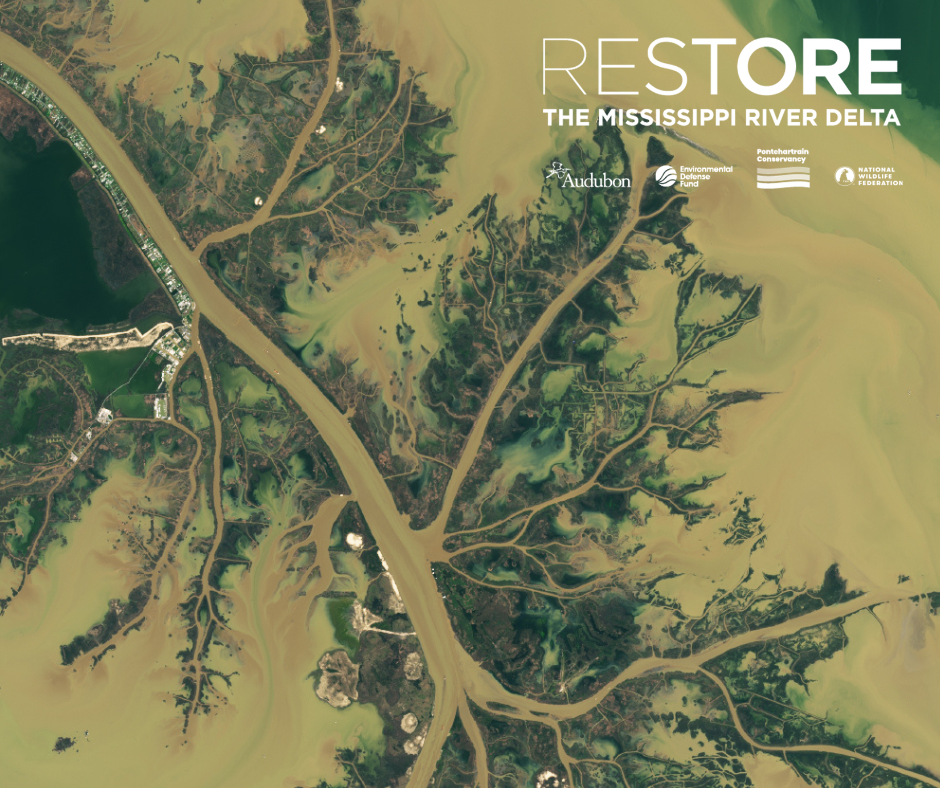Louisiana’s Coastal Program is at Risk: Louisiana’s Keystone Project in Limbo
Restore the Mississippi River Delta is concerned about the state of Louisiana’s rapidly disappearing coast, and we know you are, too. We want to keep you informed of the most critical issues currently facing our coast. This post marks the second in a series expressing our concerns about recent shifts in our state’s successful and popular coastal program, including changes to the structure of our coastal program, the protection of coastal funding, and implementation of cornerstone projects in our science-based Coastal Master Plan.
Read the first post in the series Proposed Changes to CPRA’s Structure.
Reconnecting the Mississippi River to its delta is the best way to restore our coast. The Mid-Barataria Sediment Diversion (MBSD) will do just that and has been a cornerstone project in every Coastal Master Plan.
Despite over 40 years of extensive research on this project, receiving the proper permits, and breaking ground nearly ten months ago, MBSD is currently at a standstill. The Coastal Protection and Restoration Authority (CPRA) is honoring two non-binding “stop work” orders issued by Plaquemines Parish after the new administration of the parish filed a lawsuit against the CPRA.
Stalling MBSD construction comes at a huge cost. The state has already incurred over $400 million in construction costs. The state could also be on the hook for several hundred million more dollars if the project doesn’t resume soon—money that could come either at the expense of other coastal projects or from the state’s coffers. Plus, with every single day of inaction, our state loses another 19 acres of coastal wetlands, which directly impacts the Barataria Basin, the surrounding communities and the entire regional economy.
COMMITMENT TO Mid-barataria sediment diverison?
|
Additional Background: |
Doubts started circulating about the state’s commitment to MBSD this spring. First, in early 2024, CPRA failed to challenge an appeals court ruling relegating a lawsuit to Plaquemines Parish rather than the State Supreme Court. Additionally, during the first CPRA Board meeting of the year, CPRA Chairman Gordon Dove announced a new “internal review” of MBSD led by a new, external contractor who was to deliver a report on his findings. This review seemed to be a re-investigation of a project that has gone through four decades of scientific review, has been through an extensive public feedback process, secured the necessary state and federal permits and funding and even broke ground – all while being heralded as the single largest ecosystem restoration project in U.S. history.
Recently, hard questions from two state senate committees this month helped to bring some of the details of the financial risks associated with complying with the stop work order to light, details we hope will pressure the state to find a way to get the project back on track.
WHY MID-BARATARIA IS SO IMPORTANT
The Mid-Barataria project is so vital because its scale meets the scale of our land loss crisis. It mimics the natural processes of the Mississippi River and reconnects the river to its wetlands, providing the biggest and best opportunity to address Louisiana’s land loss crisis at one of its root causes. Long after it is built, it will continue to sustain surrounding wetlands, benefiting the surrounding ecosystem and communities. Despite claims to the contrary, MBSD is also more cost-effective than dredging alone. But only if it gets built.
We need to reconnect the Mississippi River with its wetlands to restore coastal Louisiana.
With MBSD on the landscape the entire trajectory Barataria Basin will change for the better. The project is a lifeline to a basin with one of the highest rates of land loss on the planet, and it is also a symbol proving that Louisiana is capable of meeting the enormous challenges posed by its land loss crisis through a process built on science.
Click here for more information on the Mid-Barataria Sediment Diversion.
|
Issue in the News:
|
